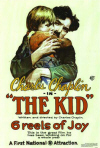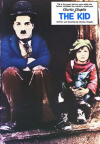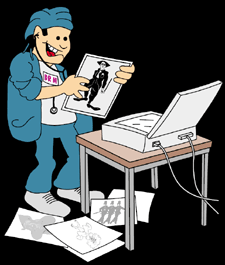 A woman leaves a maternity hospital with her baby boy. As she had the child out
of wedlock, she feels that she will not be able to take care of him properly.
She places the baby in a limousine, attaching a note to the baby's clothes. The
note asks the wealthy car owner to care for the baby. Thieves, however, steal
the car, unaware of the bundle in the back seat. When they do find the baby,
they dump him in an alley.
A woman leaves a maternity hospital with her baby boy. As she had the child out
of wedlock, she feels that she will not be able to take care of him properly.
She places the baby in a limousine, attaching a note to the baby's clothes. The
note asks the wealthy car owner to care for the baby. Thieves, however, steal
the car, unaware of the bundle in the back seat. When they do find the baby,
they dump him in an alley.
Charlie comes along and finds the baby. He tries to
put the baby into a carriage containing another baby, but fails to do so after
many attempts. After beatings by the carriage-baby's mother, he finds the note,
reads it, and decides to rear the baby himself. The mother, in a change of
heart, returns to the place where the limousine was parked and discovers that it
has been stolen.
Five years go by, and The Kid has become Charlie's
assistant in work. The Kid's job is to break windows. Charlie then pretends that
he has appeared just by chance and glazes the broken glass for a fee. Unknown to
them, The Kid's mother is now a famous singer. She has tried to make up for her
lost child by helping the poor in the slums. One day she stops a fight that The
Kid has gotten into. She urges Charlie to get a doctor for the boy, believing
Charlie to be the boy's father. The doctor sees that The Kid needs medical
attention. He sends authorities to take The Kid away from Charlie when he finds
the note that had been left with The Kid five years before.
The Kid is taken away in a truck, but Charlie, by
hopping from roof to roof, catches up with the truck, releases The Kid, and
flees with him. The doctor shows the note concerning The Kid to the mother. She
recognizes it as the note she wrote years before and puts a reward notice in a
newspaper for the return of her child. The owner of a cheap lodging house, in
which Charlie and The Kid are hiding out for the night, reads the description in
a newspaper. Realizing that it fits Charlie's companion, he steals The Kid while
Charlie is sleeping.
When Charlie awakes and finds The Kid gone, he
searches everywhere for him, unaware that The Kid had been turned over to the
police who, in turn, have given him to his mother. Worn out, Charlie falls
asleep and dreams of what heaven might be like, but is awakened by a policeman
who takes him to the home of The Kid's mother. There, Charlie is greeted by The
Kid and his mother who take him into their home and their hearts.
This was the first feature-length film written and
directed by Chaplin. "A picture with a smile and perhaps a tear" was the opening
title. It was received by critics and the public with so much praise that it
must have prompted Chaplin to consider the merits of making feature films
exclusively, although he continued with his shorter comedies until the
expiration of his First National contract. The Kid has long been considered a
classic and would have won many awards had they been as prevalent then as they
are now.

_NRFPT_10_small.jpg) It is interesting to note that the Lita Grey seen as
one of the children in the dream scene was to become Mrs. Charles Chaplin,
November 24, 1924, and the mother of Charles, Jr., and Sydney Chaplin.
It is interesting to note that the Lita Grey seen as
one of the children in the dream scene was to become Mrs. Charles Chaplin,
November 24, 1924, and the mother of Charles, Jr., and Sydney Chaplin.
In listing the cast, we have departed from the usual
alphabetical order of names because the first six players listed in the cast
received, for the first time, billing in the order given above. The other
players are listed alphabetically. This practice will be continued later,
beginning with Chaplin's first film for United Artists. In the United Artists
films the majority of the actors received cast credit on the screen.
What was said about
The Kid:
The New York Times
"The Kid is not only the longest comedy in which Chaplin has appeared
since becoming the best-known figure of the film world, but it is real comedy.
That is, it has something of a plot, its people are characters, and the fun of
it is balanced with sadness. And Chaplin is more of a comedian than a clown. It
is the comedy that has been foreshadowed by the former shorter Chaplin works.
Also, although the screen's unequaled comedian is in no danger of losing his
laurels to anyone, haste must be made to mention a new individual in his
company, as much of an individual as Chaplin himself, and a source of immense
delight. This person is a wonderful youngster by the name of
Jack Coogan, surely
not more than 6 or 7 years old, and as finished, even if unconscious, an actor
as the whole screen aggregation of players is likely to show. He is The Kid and
he will be remembered in the same image with Chaplin. They have many scenes
together, and every one of them belongs to both of them."
Theatre Magazine
"His new picture, The Kid, certainly outdoes in humor and the special
brand of Chaplin pathos, anything this popular film star has yet produced. There
are almost as many tears as laughs in this new First National release-which
proves the contention that Charlie is almost as good a tragedian as he is a
comedian...The Kid may be counted a screen masterpiece."
Variety
"In this, the longest subject he has ever released, Chaplin is less of the
buffoon and more of the actor, but his comedy is all there and there is not a
dull moment, once the comedian comes into the picture, which is along about the
middle of the first reel...Chaplin, in his more serious phases, is a revelation
and his various bits of laugh-making business the essence of originality. No
better satire has ever been offered by the comedian than the introduction of his
ragamuffin kid seated on a curbstone manicuring his nails; and his instruction
of the boy in table etiquette will register as one of the best things he has
ever done."
